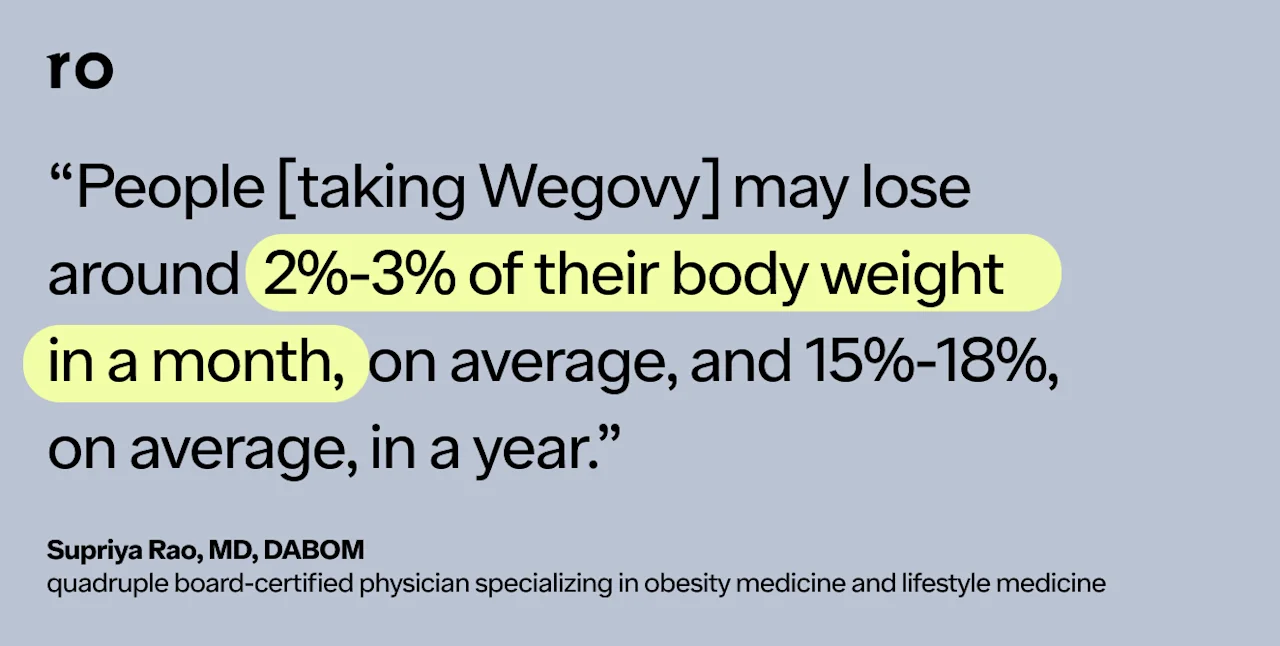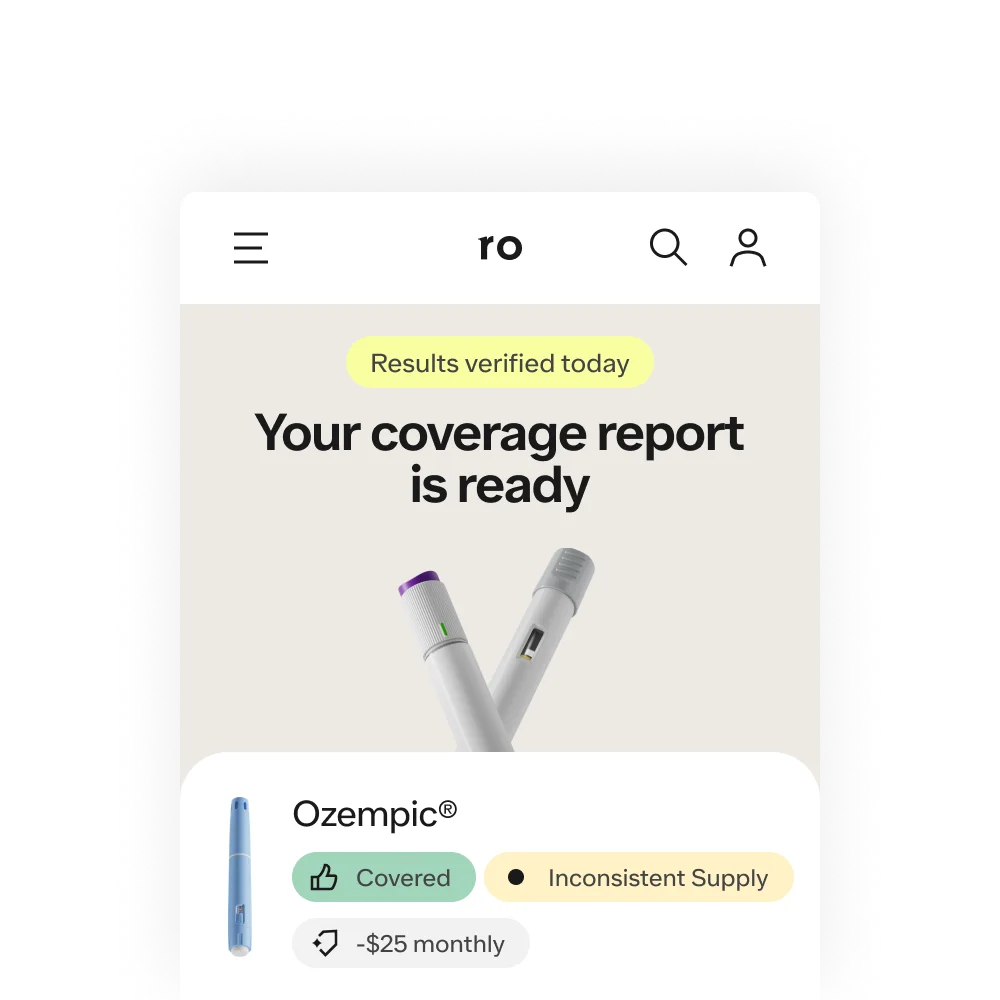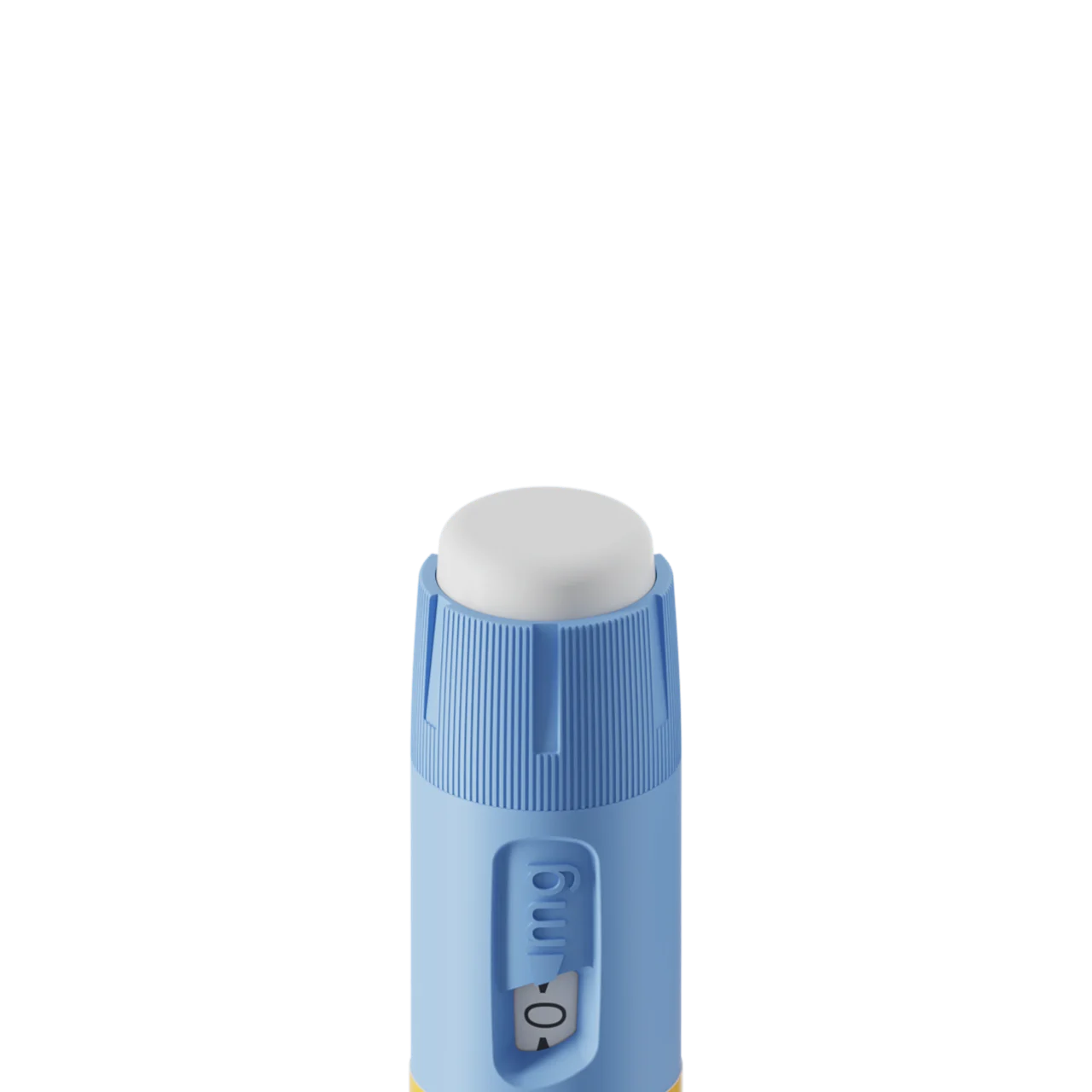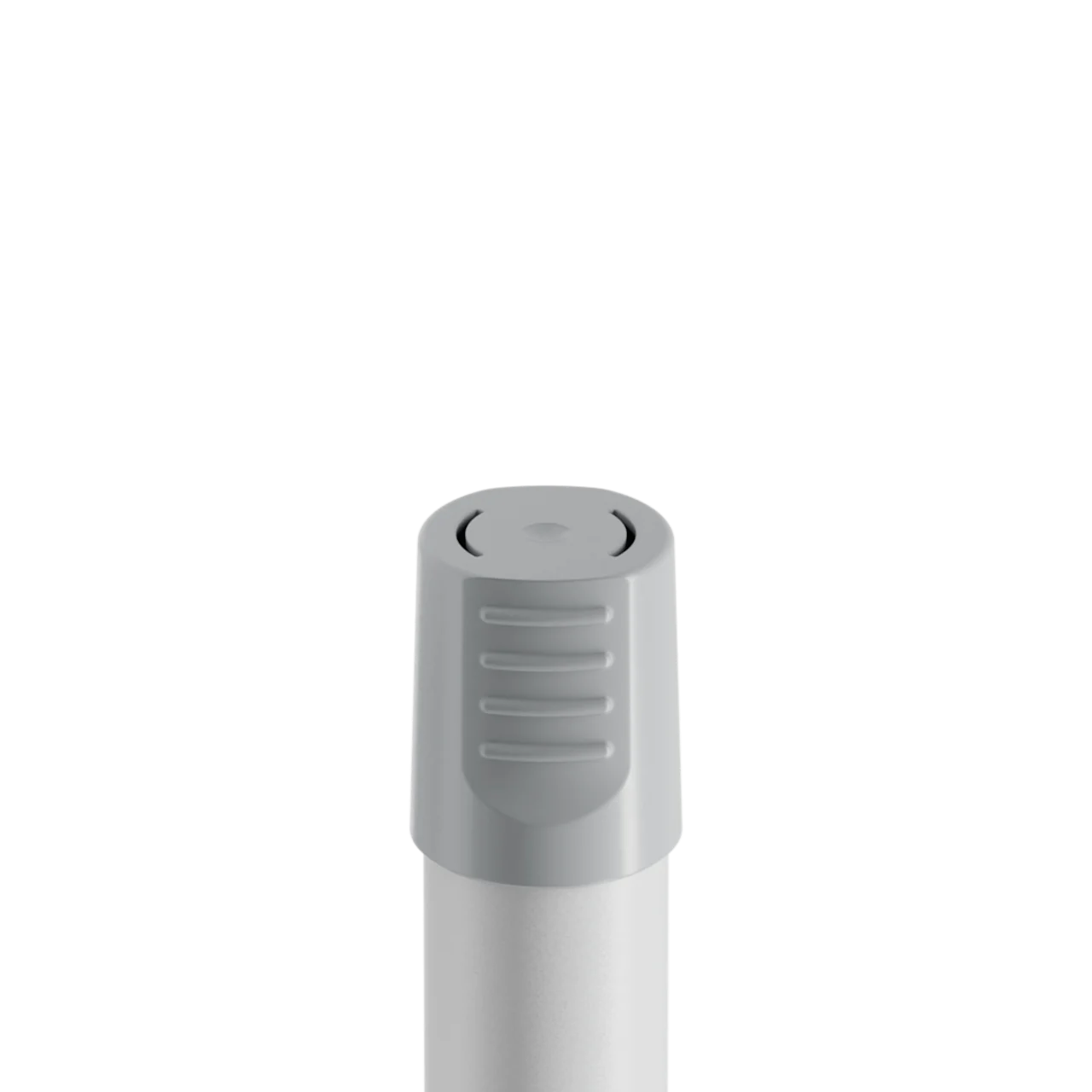Key takeaways
In clinical trials, the average weight loss on Wegovy was 15% over 68 weeks (a year and a half), with some losing even more.
Weight loss tends to start early on Wegovy, with most people losing 2%--4% of their body weight in the first month.
For the best results, Wegovy should be combined with a healthy diet, regular exercise, good sleep, and stress management.
Here's what we'll cover
Here's what we'll cover
Here's what we'll cover
Key takeaways
In clinical trials, the average weight loss on Wegovy was 15% over 68 weeks (a year and a half), with some losing even more.
Weight loss tends to start early on Wegovy, with most people losing 2%--4% of their body weight in the first month.
For the best results, Wegovy should be combined with a healthy diet, regular exercise, good sleep, and stress management.
Wegovy (semaglutide) can be a game changer when it comes to weight loss and management for people with overweight or obesity. But just how much weight can you lose on Wegovy?
To answer that question, we reviewed the research and talked to healthcare providers who specialize in obesity medicine. Read on as we share the average weight loss on Wegovy and offer tips for maximizing your weight loss on the medication.
What is Wegovy?
Wegovy is a once-weekly injectable medication that should be used in combination with a reduced-calorie diet and increased physical activity. The US Food and Drug Administration (FDA) has approved it for two indications:
To reduce body weight and support long-term weight loss in people with obesity or with overweight and a weight-related health condition, such as type 2 diabetes or sleep apnea
To reduce the risk of experiencing a major cardiovascular event, such as heart attack, stroke, or death, in people with heart disease and obesity or overweight
As a GLP-1 medication, Wegovy works by mimicking a gut hormone produced naturally by your body called glucagon-like peptide-1, or GLP-1. Wegovy works for weight loss by slowing down digestion, so you feel full sooner and longer, and acting on brain receptors that regulate your appetite.
How much weight can you lose on Wegovy?
How much weight you can lose on Wegovy depends on several factors, including your dosage, starting weight, and adherence to lifestyle changes (e.g. diet, exercise).
“Weight loss on Wegovy varies from one person to the next, but clinical trials provide general expectations,” says Audrey Wells, MD, a physician double-board certified in sleep medicine and obesity medicine.
Here’s a quick look at what studies have found regarding the average weight loss on Wegovy:
A large-scale clinical trial of over 1,900 adults found that Wegovy produced an average weight loss of 14.9% and 33.7 pounds over 68 weeks (about a year and a half). Those taking a placebo lost just 2.4% and 5.7 pounds in the same time period.
One study looked at the impact of combining Wegovy with an intensive weight loss program that included diet and exercise counseling. Those who only dieted and exercised lost nearly 6% of their starting weight in 68 weeks. Those who took Wegovy (alongside behavioral modifications), on the other hand, lost 16%.
When compared to Saxenda (liraglutide), another GLP-1 weight loss injection, Wegovy led to significantly more weight loss over 68 weeks. In clinical trials, participants lost 15.8% of their body weight on Wegovy vs. 6.4% on Saxenda.
A longer-term two-year study found that people experienced an average weight loss of 15.2% on Wegovy, compared with just 2.6% for those taking a placebo.
How much weight can you lose with Wegovy in one month?
Wegovy follows a ramp-up dosing schedule to help your body acclimate to the medication and its common side effects. It can take up to four months (or longer) to reach your final maintenance dose. For this reason, most studies observe a longer period than one month, with 68 weeks (a year and a half) being a typical time frame. During the first month of Wegovy, most people are still on the lowest dose of Wegovy (0.25 mg).
Having said that, people often do experience some weight loss during that first month. In the large-scale clinical trial cited earlier, participants lost a bit more than 2% of their body weight during the first month and another 2% during the second month. By the third month, they had lost about 6% of their body weight.
“In the first month [of Wegovy], one can expect between 2% and 4% total body weight loss with a typical dose escalation,” Dr. Wells says. “Some patients lose 5% or more of their total body weight; less weight loss may be related to a slower ramp-up with the medication.”
How quickly can you lose weight on Wegovy?
Weight loss on Wegovy occurs fairly quickly, although individual results may vary.
“People [taking Wegovy] may lose around 2%--3% of their body weight in a month, on average, and 15%--18%, on average, in a year,” says Supriya Rao, MD, DABOM, a quadruple board-certified physician specializing in obesity medicine and lifestyle medicine.
In clinical trials, about a third of the participants lost 20% or more in a year and a half. “Weight loss usually peaks around the year mark,” Dr. Wells says. “A higher body mass index (BMI) often leads to more pounds lost.”

Find out how much you could lose
Provide your biometric data to get started.

0.0
Your BMI
Underweight
< 18.5
Healthy weight
18.5 - 24.9
Overweight
24.9 - 29.9
Obesity
> 30
Can you maximize your weight loss with Wegovy?
To maximize weight loss with Wegovy, Dr. Rao recommends approaching Wegovy as part of a more comprehensive weight loss program that includes diet, exercise, and other lifestyle changes.
“Weight loss medications should not be used in isolation,” Dr. Rao says. “They’re one tool in an entire toolbox of options, and they’re great options. They’ve turned the tide for the landscape of obesity, heart disease, sleep apnea, and other issues.” That said, there are a few tactics you can implement to try to boost your results.
1. Upgrade your diet
Weight loss drugs like Wegovy work best when combined with a low-calorie diet. But it’s not just about eating fewer calories; it’s also about making sure the calories you do eat pack a bigger nutritional punch. “Where diet is concerned, I recommend three things: eat as many unprocessed foods as possible, make sure you get enough protein to support your muscles, and make sure you get enough fiber,” Dr. Wells says.
Dr. Rao recommends adopting a Mediterranean diet, which focuses on healthy fats from nuts and olive oil, lean meats like poultry and fish, and high-fiber fruits and veggies. It’s also a good idea to reduce your alcohol consumption while taking Wegovy, she adds. Alcohol can interfere with weight loss by adding empty calories and potentially increasing appetite. Additionally, since Wegovy slows gastric emptying, alcohol may have a stronger or prolonged effect, increasing the risk of side effects like nausea, dizziness, or low blood sugar.
2. Develop a regular exercise routine
Because muscle mass is directly related to basal metabolic rate (i.e. the amount of calories you burn at rest), strength training is important. Described as “the best for weight maintenance” by Dr. Wells, strength training exercises (e.g. squats, deadlifts, resistance band work) can help you preserve the muscle mass you do have while continuing to lose weight on Wegovy.
Current expert guidelines from the American College of Sports Medicine and The American Heart Association recommend strength training at least twice a week and at least 150 minutes or more of cardiovascular exercise for weight loss.
For optimization, Dr. Rao recommends an exercise routine that includes:
Strength training three times a week
Walking 10,000 steps per day
An additional cardio or yoga session
3. Enjoy a better night’s sleep
“For patients who need medication to treat obesity, it's important to note that results are optimized and maintained with a healthy foundation of smart sleep, food, and exercise choices,” Dr. Wells says. “Lack of sleep can actually increase muscle loss with the fat loss, and this is metabolically unfavorable. Sleep loss also affects decision-making and emotions, so your choices and motivation around food and exercise can be affected negatively.”
Inadequate shut-eye is associated with increases in the hunger hormone ghrelin, increased snacking, and weight gain.
To make sure your sleep isn’t messing with your weight loss efforts, Dr. Rao recommends prioritizing getting 7–9 hours of sleep per night that’s restful and uninterrupted. “Create a new shutdown sequence. Improve your sleep hygiene, and get technology out of the bedroom,” she says.
Other sleep hygiene tips (that may help boost how much weight you can lose on Wegovy) include:
Following a consistent sleep schedule
Practicing relaxation exercises before bed
Using your bed for sleep and sex only
Avoiding alcohol, heavy meals, and caffeine in the evening
Quitting smoking
4. Keep your stress levels in check
Stress can worsen sleep quality and lead to weight gain. Similar to short sleepers, people who are chronically stressed out tend to binge eat, especially on high-calorie, sugary foods.
Mindfulness exercises can help people deal with stress, Dr. Rao says. Mindfulness helps you tune into the present moment, focusing on your thoughts, senses, and feelings without judgment. Popular options include:
Meditation, including visualization and guided meditation
Deep breathing exercises
Progressive relaxation exercises
5. Build your support network
Working with other health professionals besides the healthcare provider who prescribed you Wegovy can set you up for more success on your weight loss journey. Dr. Rao recommends that her patients meet with a nutritionist to optimize the amount of fiber, protein, and macronutrients they eat and reduce their intake of processed foods and animal proteins.
Finding a weight loss “buddy” can also be a good idea. “Having that camaraderie of going through this with somebody and having familial support can help people maximize their weight loss,” Dr. Rao explains. Indeed, a 2018 study of over 700 people in an online weight loss program found that those who chose buddies lost more weight and inches off their waistlines than those who went at it alone.
Rx weight loss with Ro
Get access to prescription weight loss medication online
Bottom line
Clinical trials show impressive weight loss results on Wegovy, but it’s worth remembering how much weight you can lose on Wegovy differs from person to person. Factors like your diet, exercise, sleep, and stress levels can all play a role in maximizing your slim-down results.
Weight loss on Wegovy typically begins early in treatment, with most people losing 2% of their body weight or more in the first month. Clinical trials show an average weight loss of around 15% of body weight over 68 weeks, with a small amount of individuals losing 20% or more.
Diet and exercise are key to maximizing weight loss on Wegovy. Experts recommend eating a nutrient-dense, high-fiber, and protein-rich diet, such as the Mediterranean diet. Exercise, especially strength training, can help preserve muscle and sustain long-term weight loss.
Your sleep quality and stress levels can also impact weight loss success on Wegovy (and, TBH, in general). Poor sleep can contribute to weight gain, while getting 7-9 hours of restful sleep per night supports long-term weight management. Meanwhile, managing stress can prevent overeating and weight regain and can be done via mindfulness techniques such as meditation, deep breathing, and yoga.
Having a strong support system in place can also improve average weight loss on Wegovy. In addition to consulting your prescribing provider, working with healthcare professionals and having a weight loss buddy can help you feel more motivated to stick to your new healthy habits and reach your weight loss goals.
Frequently asked questions (FAQs)
Can I lose 80 pounds on Wegovy?
Everyone’s weight loss journey is different. The amount of weight you lose on Wegovy can depend on your initial body weight, how long you take Wegovy, and your adoption of healthy lifestyle habits. In one clinical trial, the average body weight of participants randomized to Wegovy was 232 pounds at the start of the trial. After 68 weeks of taking Wegovy, they had lost an average of nearly 34 pounds or nearly 15% of their body weight.
How long does it take to lose weight with Wegovy?
How long it takes to lose weight with Wegovy can vary from person to person. Some people start noticing weight loss within the first month of Wegovy treatment. Studies of Wegovy usually observe participants for a period of 68 weeks, or about a year and a half. Within that time frame, people typically lose 15% of their body weight, on average.
DISCLAIMER
If you have any medical questions or concerns, please talk to your healthcare provider. The articles on Health Guide are underpinned by peer-reviewed research and information drawn from medical societies and governmental agencies. However, they are not a substitute for professional medical advice, diagnosis, or treatment.
Wegovy Important Safety Information: Read more about serious warnings and safety info.
GLP-1 Important Safety Information: Read more about serious warnings and safety info.
Saxenda Important Safety Information: Read more about serious warnings and safety info.
References
Collins, C. & Costello, R. A. (2024). Glucagon-Like Peptide-1 Receptor Agonists. StatPearls. Retrieved from https://www.ncbi.nlm.nih.gov/books/NBK551568/
Cox, C. E. (2017). Role of Physical Activity for Weight Loss and Weight Maintenance. Diabetes Spectrum : A Publication of the American Diabetes Association, 30(3), 157–160. doi: 10.2337/ds17-0013. Retrieved from https://www.ncbi.nlm.nih.gov/pmc/articles/PMC5556592/
Dailey, R., Romo, L., Myer, S., et al. (2018). The Buddy Benefit: Increasing the Effectiveness of an Employee-Targeted Weight-Loss Program. Journal of Health Communication, 23(3), 272–280. doi: 10.1080/10810730.2018.1436622. Retrieved from https://pubmed.ncbi.nlm.nih.gov/29452062/
Donnelly, J. E., Blair, S. N., Jakicic, J. M., et al. (2009). American College of Sports Medicine Position Stand. Appropriate physical activity intervention strategies for weight loss and prevention of weight regain for adults. Medicine and Science In Sport & Exercise, 41(2), 459-471. doi: 10.1249/MSS.0b013e3181949333. Retrieved from https://pubmed.ncbi.nlm.nih.gov/19127177/
Garvey, W. T., Batterham, R. L., Bhatta, M., et al. (2022). Two-year effects of semaglutide in adults with overweight or obesity: the STEP 5 trial. Nature Medicine, 28(10), 2083–2091. doi: 10.1038/s41591-022-02026-4. Retrieved from https://pmc.ncbi.nlm.nih.gov/articles/PMC9556320/
Jensen, M. D., Ryan, D. H., Apovian, C. M., et al. (2014). 2013 AHA/ACC/TOS guideline for the management of overweight and obesity in adults: a report of the American College of Cardiology/American Heart Association Task Force on Practice Guidelines and The Obesity Society. Circulation, 129(25 Suppl 2), S102–S138. doi: 10.1161/01.cir.0000437739.71477.ee. Retrieved from https://www.ahajournals.org/doi/10.1161/01.cir.0000437739.71477.ee
Jensterle, M., Rizzo, M., Haluzík, M., et al. (2022). Efficacy of GLP-1 RA Approved for Weight Management in Patients With or Without Diabetes: A Narrative Review. Advances In Therapy, 39(6), 2452–2467. doi: 10.1007/s12325-022-02153-x. Retrieved from https://www.ncbi.nlm.nih.gov/pmc/articles/PMC9063254/
Markwald, R. R., Melanson, E. L., Smith, M. R., et al. (2013). Impact of insufficient sleep on total daily energy expenditure, food intake, and weight gain. Proceedings of the National Academy of Sciences of the United States of America, 110(14), 5695–5700. doi: 10.1073/pnas.1216951110. Retrieved from https://pubmed.ncbi.nlm.nih.gov/23479616/
Oppert, J. M., Ciangura, C., & Bellicha, A. (2023). Physical activity and exercise for weight loss and maintenance in people living with obesity. Reviews in Endocrine & Metabolic Disorders, 24(5), 937–949. doi: 10.1007/s11154-023-09805-5. Retrieved from https://pubmed.ncbi.nlm.nih.gov/37142892/
Papatriantafyllou, E., Efthymiou, D., Zoumbaneas, E., et al. (2022). Sleep Deprivation: Effects on Weight Loss and Weight Loss Maintenance. Nutrients, 14(8), 1549. doi: 10.3390/nu14081549. Retrieved from https://www.ncbi.nlm.nih.gov/pmc/articles/PMC9031614/
Rubino, D. M., Greenway, F. L., Khalid, U., et al. (2022). Effect of Weekly Subcutaneous Semaglutide vs Daily Liraglutide on Body Weight in Adults With Overweight or Obesity Without Diabetes: The STEP 8 Randomized Clinical Trial. JAMA, 327(2), 138–150. doi: 10.1001/jama.2021.23619. Retrieved from https://pubmed.ncbi.nlm.nih.gov/35015037/
Saner, N. J., Lee, M. J., Pitchford, N. W., et al. (2020). The effect of sleep restriction, with or without high-intensity interval exercise, on myofibrillar protein synthesis in healthy young men. The Journal of Physiology, 598(8), 1523–1536. doi: 10.1113/JP278828. Retrieved from https://pubmed.ncbi.nlm.nih.gov/32078168/
Tomiyama, A. J. (2019). Stress and Obesity. Annual Review of Psychology, 70, 703–718. doi: 10.1146/annurev-psych-010418-102936. Retrieved from https://www.annualreviews.org/content/journals/10.1146/annurev-psych-010418-102936
U.S. Food and Drug Administration (FDA). (2024). Highlights of Prescribing Information: Wegovy (semaglutide) injection, for subcutaneous use. Retrieved from https://www.accessdata.fda.gov/drugsatfda_docs/label/2024/215256s015lbl.pdf
van Egmond, L. T., Meth, E. M. S., Engström, J., et al. (2023). Effects of acute sleep loss on leptin, ghrelin, and adiponectin in adults with healthy weight and obesity: A laboratory study. Obesity (Silver Spring, Md.), 31(3), 635–641. doi: 10.1002/oby.23616. Retrieved from https://pubmed.ncbi.nlm.nih.gov/36404495/
Wadden, T. A., Bailey, T. S., Billings, L. K., et al. (2021). Effect of Subcutaneous Semaglutide vs Placebo as an Adjunct to Intensive Behavioral Therapy on Body Weight in Adults With Overweight or Obesity: The STEP 3 Randomized Clinical Trial. JAMA, 325(14), 1403–1413. doi: 10.1001/jama.2021.1831. Retrieved from https://pmc.ncbi.nlm.nih.gov/articles/PMC7905697/
Wadden, T. A., Chao, A. M., Moore, M., et al. (2023). The Role of Lifestyle Modification with Second-Generation Anti-obesity Medications: Comparisons, Questions, and Clinical Opportunities. Current Obesity Reports, 12(4), 453–473. doi: 10.1007/s13679-023-00534-z. Retrieved from https://pmc.ncbi.nlm.nih.gov/articles/PMC10748770/
Wilding, J. P., Batterham, R. L., Calanna, S., et al. (2021). Once-Weekly Semaglutide in Adults with Overweight or Obesity. New England Journal of Medicine, 384(11), 989–1002. doi: 10.1056/nejmoa2032183. Retrieved from https://www.nejm.org/doi/full/10.1056/NEJMoa2032183
Yeomans, M. R. (2010). Short term effects of alcohol on appetite in humans. Effects of context and restrained eating. Appetite, 55(3), 565–573. doi: 10.1016/j.appet.2010.09.005. Retrieved from https://pubmed.ncbi.nlm.nih.gov/20851724/



















